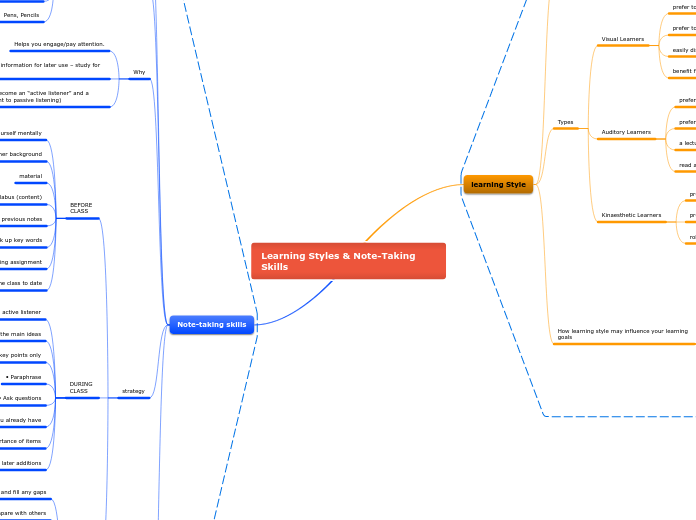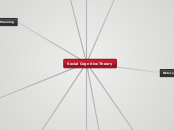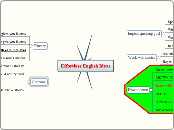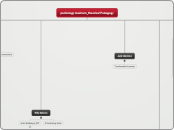Learning Styles & Note-Taking Skills
Type in your name
Note-taking skills
Personal skills
Skills can be truly valuable when it comes to convincing a potential employer. Along with work experience and education, your skills will help the employer get a better understanding of your interests and values.
Methods
Matrix Method
Cornell Method
Outline Method
strategy
Specify any other skills which you believe qualify you for the position you are applying.
AFTER
CLASS
Review
• Not easy – habit takes time
• Write a brief summary
• Find answers to any questions remaining unanswered
• Hearing a thing once is not enough. Memory requires review and understanding
• Ask for any clarification
• Discuss/Compare with others
• Review your notes and fill any gaps
DURING
CLASS
• Leave blank space for later additions
• Use symbols to indicate importance of items
• Integrate with other knowledge you already have
• Ask questions
• Paraphrase
• Write key points only
• Get the main ideas
• Be an active listener
BEFORE
CLASS
• Think through what has happened in the class to date
• Review any reading assignment
• Look up key words
• Review previous notes
• Review syllabus (content)
material
• Review your notes and other background
Prepare yourself mentally
Why
These skills enhance your interactions, job performance and career prospects. Soft skills are broadly applicable both in and outside the workplace, and relate to a person's ability to interact effectively with coworkers and customers.
team playerflexibilitygood communication skillsproblem-solving skillscreative thinkingconfidenceOther
Taking notes helps you become an “active listener” and a “critical thinker”. (different to passive listening)
Notes serve as a “file” of information for later use – study for EXAM!
Helps you engage/pay attention.
What materials do you need
Computer skills you master
Companies are becoming more and more dependent on technology, so your computer skills can easily increase your chances of getting a job that requires such skills. Specify the types of computer skills you master.
Pens, Pencils
Folders with pockets to keep things organized
Binder for organizing
Loose-leaf paper (Notebook)
Your language skills can play an increasingly important role in the workplace.
Specify what languages you know
taking into consideration the levels of understanding, speaking and writing.
EnglishSpanishItalianGermanJapaneseOther
Writing down ideas from lectures and readings in your
own words
learning Style
Contact information
Any CV or résumé needs to contain your contact information. This way, recruiters can get in touch with you.
How learning style may influence your learning
goals
E-mail is the preferred form of communication in today's work environment.
Type in your e-mail address so that the recruiter can easily contact you.
• Better time-management
• Apply right style in right context
• Greater academic success
• Consequently, become an effective learner
• Identify style that makes your learning ineffective
• Identify styles that develops your skills
• Understand how you learn best
Types
Type in your mobile phone number.
Kinaesthetic Learners
role playing help to remember and learn.
prefer touch for taking information
prefer to learn through movement
Auditory Learners
read aloud to themselves.
a lecture with a little efforts.
prefer to hear information; can absorb
prefer to learn by hearing
Visual Learners
benefit from using charts, maps and notes.
easily distracted without visual aids.
prefer to see information such as pictures.
prefer to learn by sight.
What
Type in your personal phone number.
Learning style is the ‘way’ we
take in information and develop
our knowledge or skills









